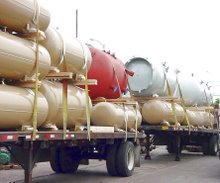The ASME BPVC is divided into the following 14 sections:
Section I
Power Boilers
Section II
Material Specifications
Section IID
Material Specifications Part D
Section IIDM
Material Specifications Part D, Metric
Section III
Rules for Construction of Nuclear Power Plant Components
Section IV
Heating Boilers
Section V
Nondestructive Examination
Section VI
Recommended Rules for Care and Operation of Heating Boilers
Section VII
Recommended Guidelines for Care of Power Boilers
Section VIII
Pressure Vessels
Section IX
Welding and Brazing Qualifications
Section X
Fiberglass, Reinforced Plastic Pressure Vessels
Section XI
Rules for In-Service Inspection of Nuclear Facility Components
Section XII
Rules for Construction and Continued Service of Transport Trucks
The ASME BPVC is available in the collections and sections outlined below, Code Cases, Interpretations, and ASME Referenced Standards. All subscriptions come with version control, update service, alerts, and bibliographic access to more than 1 million current and historical standards.
more


